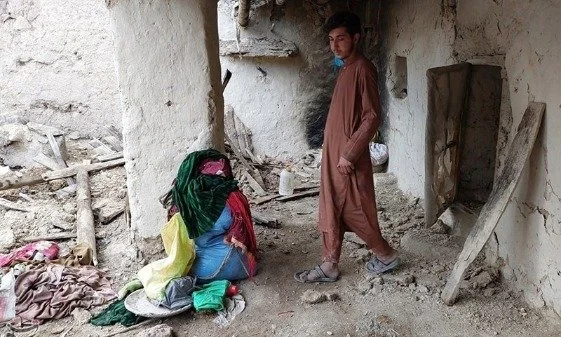Earthquake in Afghanistan Kills 1,400, Demands Global Response Despite Politics
Rescue Hindered by Aid Cuts and Poor Access
September 3, 2025
A survivor of the 2022 earthquake stands outside a damaged home in Afghanistan. Photo by Tasnim News Agency, licensed under Creative Commons.
At least 1,400 people have died and more than 3,100 have been injured in a powerful 6.0-magnitude earthquake that struck northeastern Afghanistan on the night of Aug. 31. The scale of devastation and the lack of timely global support indicate the growing tendency to let geopolitics override humanitarian imperatives.
The earthquake flattened villages across Kunar, Nangarhar and neighbouring provinces, where homes made of mud bricks and wood stood little chance. Heavy rains in the days before the quake triggered landslides and rockfalls that blocked access routes, further delaying emergency response.
According to UNICEF’s Salam Al-Jabani, aid workers had to walk hours to reach some areas, with several villages still inaccessible even by helicopter.
At least 5,400 homes have been destroyed. Many health centres are damaged and unusable, with some medical staff treating patients outdoors, under trees. Survivors have been left without shelter, clean drinking water or medical supplies. Aftershocks, including one measuring 5.2 on Sept. 2, added to the chaos.
Many victims remain under debris, and rescuers have said that body bags are now among the most urgent needs.
Mobile connectivity is largely absent. There is only one functioning cell tower in the affected region, and the nearest UNICEF-supported hospital can only send medical supplies on foot.
Local communities have stepped in to provide food and water and assist with search operations. “People in their thousands are moving in and out of the area,” Al-Jabani said in a statement.
The United Nations has deployed at least 25 assessment teams and increased air service flights from Kabul. The UNHCR has sent tents, blankets and solar lamps. The United Arab Emirates has dispatched food and medical supplies, and search teams. The United Kingdom and European Commission have pledged emergency funds.
However, the overall flow of aid remains limited. Indrika Ratwatte, a senior United Nations official assigned to Afghanistan, warned that the resilience of communities has been “saturated” by repeated crises and that current efforts are a race against time.
This is Afghanistan’s third major earthquake since the Taliban came to power in 2021. Humanitarian funding has plummeted. Aid to the country has dropped from $3.8 billion in 2022 to just $767 million this year. The United States alone has withdrawn over $1.7 billion in contracts. Most Western countries have scaled down operations following the Taliban’s clampdown on women’s rights, political freedoms and media.
The shrinking support coincides with growing needs. Millions have been forcibly returned from Iran and Pakistan. A prolonged drought, a nutrition crisis and other ongoing shocks have left Afghan aid workers stretched thin. Many organisations are still working in earthquake-affected areas from previous disasters in Herat and Paktika.
Despite the Taliban’s appeal for global assistance, few countries have responded. Some cite operational constraints and security risks. Others avoid any form of engagement that could lend legitimacy to the current regime.
But it is the people of Afghanistan, not the ruling authorities, who are now under rubble, awaiting rescue and relief.
Indian media also appear to be silent. Coverage of the earthquake has largely been absent from front pages. Afghanistan is India’s neighbour. It is home to communities that have shared trade, cultural and linguistic ties for centuries. The distance created by political disengagement has entered the public imagination.
Afghanistan’s crisis demands a separation of people from politics.
Disaster response should not be treated as a reward for good governance. It’s an ethical obligation towards those whose lives are shattered by conditions they did not create.
The current moment presents a test of international priorities. Ignoring Afghanistan now, while it pleads for help, sends a message that people under repressive regimes are beyond the world’s care. That message carries consequences far beyond one border. It sets a precedent where global relief becomes conditional, not on need, but on political alliances.
In practical terms, it also creates dead zones in global disaster preparedness. If donors disengage from countries based on who rules them, entire populations will fall outside international systems of response, monitoring and recovery. Climate disasters, earthquakes and pandemics do not negotiate with governments. They target geography, not ideology.
The world must rethink its frameworks of solidarity.
You have just read a News Briefing by Newsreel Asia, written to cut through the noise and present a single story for the day that matters to you. Certain briefings, based on media reports, seek to keep readers informed about events across India, others offer a perspective rooted in humanitarian concerns and some provide our own exclusive reporting. We encourage you to read the News Briefing each day. Our objective is to help you become not just an informed citizen, but an engaged and responsible one.

